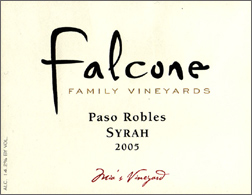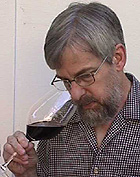

Falcone Family Vineyards
2005 Syrah, Mia's Vineyard(Paso Robles)
In John and Helen Falcone’s previous life, as high profile Napa Valley vintners, they may have had a passing association with Syrah, but it was certainly not their forte. Then they moved to the Central Coast, aka syrah heaven, to become the winemaking team at Rusack Vineyards. That’s their day job. On the side, they established Falcone Family Vineyards, sourced solely from their Mia’s Vineyard (named after their daughter, so it really is a family affair) in the Paso Robles appellation. While Cabernet does well in their vineyard, they knew they had to go for it with Syrah as well.
Their Syrah hunch was well founded. The 2005 version is a very complete wine, beginning with a beauty of a very open nose, with lavender, blackberry, blueberry and a whiff of barrel toast integrated into the proceedings. Enchantingly rich in the mouth, the wine is not, however, over powering or overly alcoholic. Quite concentrated with flavors of mulberry, boysenberry, blackberry, blueberry and loganberry, it all comes together with the intensity of a Knott’s Berry Farm jam. Aged sixteen months in French oak (46% new) and unfiltered, it shows a smooth, warm, mouth caressing texture and finely grained tannins. You could age it three to five years but it’s very inviting right now. A textbook primer on how to make an accessible and user friendly Syrah.
Reviewed June 12, 2007 by Dennis Schaefer.
Other reviewed wines from Falcone Family Vineyards
|
Falcone Family Vineyards 2005 Cabernet Sauvignon, Mia's Vineyard (Paso Robles)Dennis Schaefer 5/22/2007 |
The Wine
Winery: Falcone Family Vineyards |
The Reviewer Dennis Schaefer
Dennis Schaefer
Dennis Schaefer has been tasting and writing about wine for over 30 years, propelled by a continuing curiosity and burgeoning enthusiasm for discovering what’s in the bottle. Blessed with catholic tastes, he enjoys everything from the obvious to the sublime. A major requirement is that the vineyard, winery and winemaker consistently perform well and fulfill their potential. Balance, concentration and complexity are key to the tasting experience but, in the end, the purpose of wine is simply to give pleasure. |











